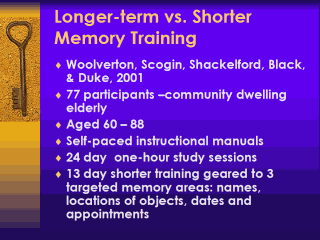 |
A different study looked at longer vs shorter memory
training. This is not as long and this is quite different from the training we just talked
about. In this one 77 people aged 60-88, they used a self-paced instructional manual which
they had developed for a previous study and they split it apart into a 24-day one and a
13-day much shorter version, essentially half of it. And they raised the point that a lot
of memory training is too vague, too broad. People complain about specific things and
thatís what we should target and pay attention to that. And so they trained people on
names, remembering names, remembering locations of things, their keys, their wallets, and
remembering dates and appointments. And they theorized that this would be actually more
effective because this was meaningful to people as people come in complaining about and we
donít need to be doing these broad based training on strategies and they were wrong. |
